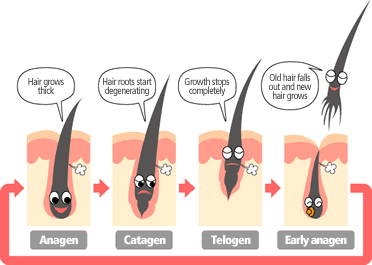
Anagen effluvium: Sudden hair loss

10/11/16
Read all about sudden hair loss below.
Anagen Effluvium is a form of alopecia in which there is a sudden and even loss of hair all over the head. It occurs as a consequence of the action of a harmful agent that suddenly interrupted the phase of hair growth.
Anagen Effluvium is a form of alopecia in which there is a sudden and even loss of hair all over the head.
It occurs as a consequence of the action of a harmful agent that suddenly interrupted the phase of hair growth.
Why does anagen effluvium occur?
The causes that lead to hair loss in anagen effluvium are chemotherapy, some drugs (bismuth, levodopa, cyclosporine), exposure to chemicals, radiotherapy, endocrine diseases, pemphigus vulgaris, trauma, etc.
Hair grows continuously and goes through three basic phases: anagen, catagen and telogen.
Anagen or growth phase is the period when follicular cells multiply and keratinize. It is estimated that 85% of hair is in this phase at any given time.
It is during the growth phase that anagen effluvium can occur. It occurs when an agent disrupts the mitotic or metabolic activity of hair follicles.
The onset of anagen effluvium is very rapid. In some people, whole tufts of hair fall out in the first two weeks.
It should be noted that anagen effluvium is reversible, so that after the end of chemotherapy or removal of the factor that led to the disorder, the hair grows back.












